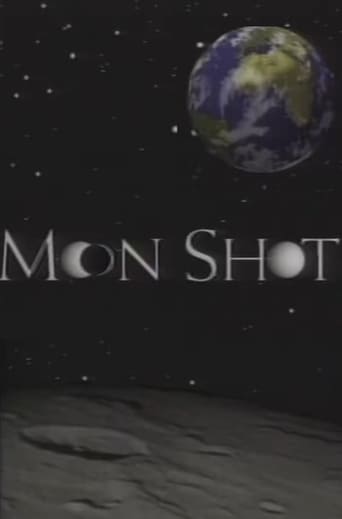


Moon Shot
The inside story of America's race to the moon.
-
- Cast:
- Barry Corbin


Similar titles
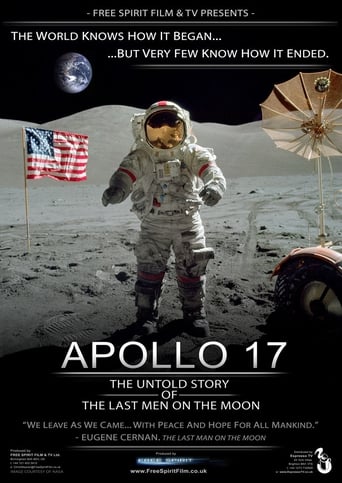
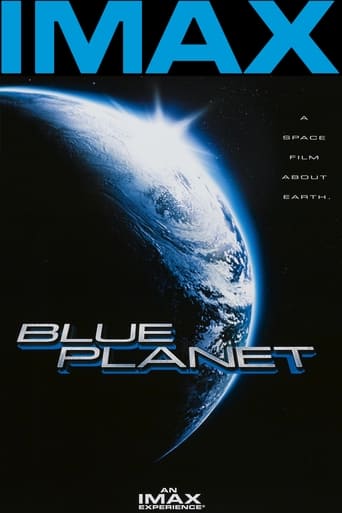
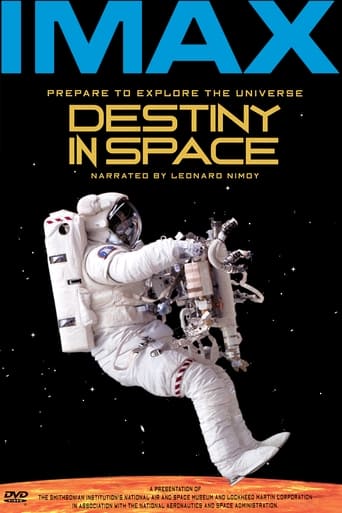
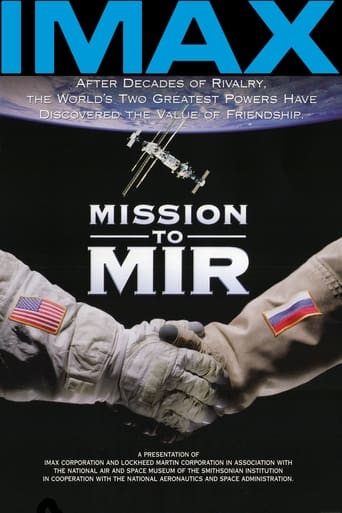
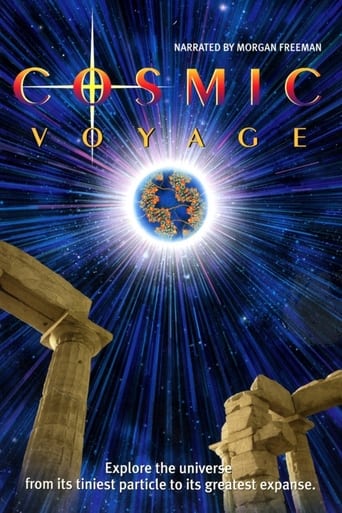
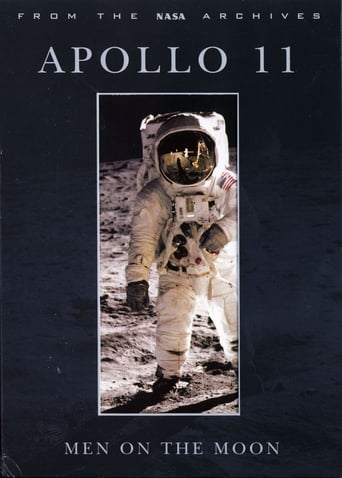

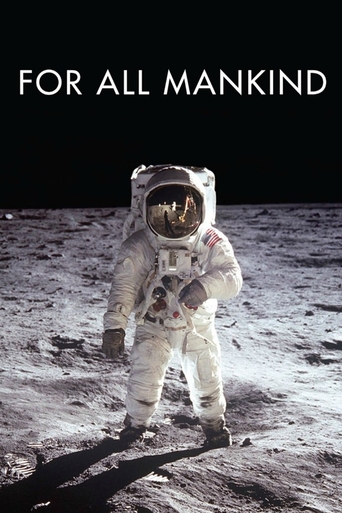
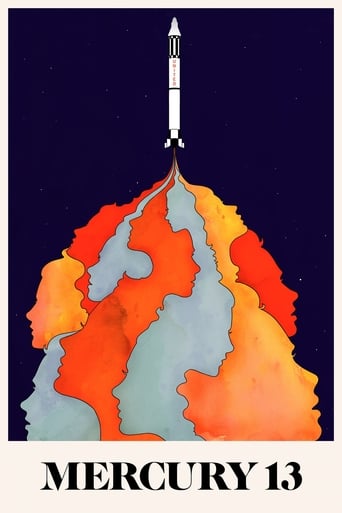
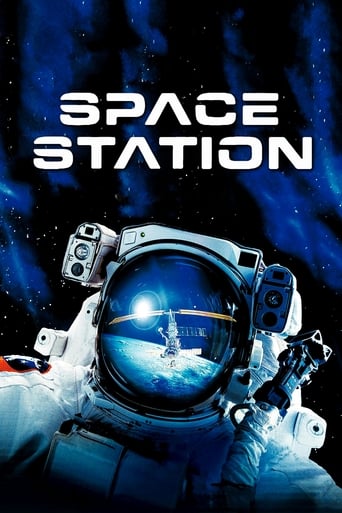
Reviews
Very very predictable, including the post credit scene !!!
A great movie, one of the best of this year. There was a bit of confusion at one point in the plot, but nothing serious.
It's easily one of the freshest, sharpest and most enjoyable films of this year.
Through painfully honest and emotional moments, the movie becomes irresistibly relatable
This series is about the race to the moon viewed from the the perspective of the American Space Program from Mercury to Apollo. Retired astronauts, engineers, and program managers reminisced about their involvement in the program which makes this 4 hour program an invaluable documentary of the history of American space exploration.What kind of an era was this when people were able to dream such grand adventure, and actually pull it off ? Sadly space exploration was put on hold due to domestic issues of feeding the poor, but 40 years later, those problem still persists, and we're not officially back on moon for all the years. Makes you wonder if the protest of the poor were just a sour grape to find an easy target to take pot shots at.There's still magic in seeing the giant Saturn V rocket take off, and space crafts making docking maneuvers in space. It could be the best of the movies, but even better. Will we see the spirits of adventure like this in our life time again ? If not, we've lost something valuable to all humanity.
1994 and 1995 became bumper seasons for American retrospectives about having gone to the moon, both in print and on film. When the story first broke in 1993 that Apollo astronaut Jim Lovell was writing the story of his own dramatic yet uplifting Apollo 13 mission, and it was being made into a Hollywood film; -well, you can bet that his old friend Al Shepard would want to match that.The good news is that he did.Alan Shepard and Deke Slayton co-wrote Moon Shot, published also in 1994, and it was turned into a Turner Broadcasting System (TBS) production of 8x1/2-hr installments rolled into one 192min video, Moon Shot (1994). Moon Shot is an astronaut-narrated documentary, the type I always wanted to see. Science journalist Andrew Chaikin's decade-long project to tell the same story, which first resulted in his highly respected book A Man on the Moon, published also in 1994, later becoming the basis for Tom Hanks'From the Earth to the Moon (1998), has ended up with a wider perspective. Of course, we need that, too. But for shee entertainment value, you cannot go past Moon Shot. It has the added advantage of fitting onto one tape, rather than six. It's a much more emotionally immediate (addictive) and economical way to tell the same story. The acted-out recreations of FETTM usually just make me cry, and I find myself needing to psyche up even to choose which tape to watch. Moon Shot's relative brevity and immediacy are powerful incentives.We see and hear the original astronauts in footage from the '60s, sometimes in opinionated fashion. These are not re-enactments. The beginning is instantly engaging: Kennedy's speech instigating the programme "gave everyone moon fever. The whole country went to work on the moon shot. We practically had a big sign chiselled there up in the sky that said 'Waste anything but time'". Moon Shot consist of the private memories of the people involved. Remember John Glenn's "fireflies"? It is in Moon Shot that we finally discover that they were from the Constellation Urion (urine).We hear interviews with all the major players some 30 years later. Most of them are still alive (Al died 1998, Deke 1994, Gus 1967). The astronauts remaining by 1994 become friends to the viewer as well, because we hear them talking about so many things, and each other, on a first name basis. I now can recognize Alan and Wally and Jim (etc) just by their voice alone: I can turn my back and know who's talking. This video really compels us to honor them, warts and all.We find out that all the astronauts were incredibly competitive, admittedly to the point even of foolishness. They resented the chimps (shock/ horror). They were basically fighter jocks with egos the size of planets (How many fighter jocks does it take to change a light bulb? Just one- he holds the bulb and the world revolves around him), and Coco Beach became their playground, where they got up to all the same hijinks that felled Kennedy's reputation.Yet no-one dared contradict them much. Gunther Wendt tried that with Alan Shepard, and got an ashtray thrown at his head for his trouble. So I think it took the distance of time, plus the humility imposed by the majesty of space where they really have gone before and come back from, to mellow the surviving astronauts into something resembling Everyman again.The 1960s were heady, very, very political times (the Apollo programme was largely funded by the CIA, although I don't think that's revealed in this video). Near the beginning of Moon Shot, we see original interviews of people on the street feeling the ego-bruising effects of Sputnik, and exhorting(!) American leaders to overtake the Russians. People thought the way they were taught to think (ie not as informed as they might have been), and they were frightened. Those were different times. Apollo was always going to be a political football. So perhaps to play against all the propaganda, The Bill Dana Show around 1964 featured a hilarious skit featuring Dana's creation "Jose Jimenez, Astronaut". It is included in the first episode on Moon Shot. The comic (actually Hungarian comic writer William Szathmary) impersonated a frightened astronaut fully suited up but holding his helmet, with Gary Crosby as his straight man. The routine goes as follows: Gary Crosby: (pointing to the astronaut's helmet) Is that the crash helmet? Astronaut: Oh I hope not. Gary Crosby: Ah, after you leave the moon, sir, when you come back to Earth, where will you be landing? Astronaut: I will be landing in Nebatha. Jes, de state of Nebatha. Gary Crosby: Then you're convinced they will get you back to Earth? Astronaut: Jes, just how far into it, that's what I'm not convinced about. Gary Crosby: Well, surely they've provided something to break your fall? Astronaut: Oh jes. De State of Nebatha.But the two most touching, heartrending stories from the Gemini and Apollo programmes both concern Gus Grissom. I now love Gus. He died on Pad 34. Go Fever, the insane round-the-clock schedule they all kept, ensured that no-one re-examined the decisions made to solve the "5-20 insurmountable problems a day". So the highly pressurized oxygen atmosphere, combined with combustible materials within the capsule were allowed to stay in the design from Gemini. Until a short sparked one exhausting 1967 Friday during the last ground test on Pad 34. And just like that, Gus was gone. But the astronaut's perspective on Moon Shot explains: "If one of us didn't make it, there'd be six of us left. And don't kid yourself. As soon as the funeral was over, we'd be lining up to take the next ride. That was the test business." Gus would have said the same.Thanks guys, for having gone where other people will someday go again. Into that photographically irreproducible blackness of true space. Live long and prosper. 10/10.
It's ironic that the film Star Wars premiered only a very few years after the last Apollo flight. Of course, Star Wars became one of the greatest commercial successes in film history. The Apollo program died, because people weren't interested anymore. Perhaps many of us like to fantasize about space more than really doing something about going there. However, there was a time when that wasn't so. Moon Shot is an absolutely superb documentary about how the space program went from a short flight of fifteen minutes to man walking on the moon in less than a decade. Through interviews with some of the astronauts from that period, it also shows that people who ventured into space were just that-real people. They were not named Darth or Luke, nor were they the offspring of intergalactic royalty. The didn't wear capes or spandex costumes or use the Force. Rather, they were named Al or Gus or John or Neil. They came from working class backgrounds in many cases (John Glenn's father was a plumber). They had families, mortgages, and car payments. They worked hard, and sometimes made mistakes. They also did great things. By telling what happened, and having some of them tell what happened, Moon Shot is a wonderful chronicle of their accomplishments.
Based on the book of the same name, Moon Shot gives a real-life account of NASA's race for the moon by two men who were intimately involved: Deke Slayton and Alan Sheppard.Much of this film is a gathering of the 5 remaining Mercury Astronauts - Al Sheppard, John Glenn, Scott Carpenter, Wally Schirra and Gordo Cooper. They reminisce about the old days and their different perspectives, something you don't get in the book, which is also excellent. Barry Corbin fills in as the voice, but not the image, of Deke Slayton. I think Corbin's part was a nice touch, narrating Deke's contributions to the book. I think it was interesting too that they got Corbin to play a former astronaut when he played former astronaut Maurice Minnifield on Northern Exposure for several years. Maybe intentional, maybe not, but a fine piece of casting. :)If you liked the film, read the book. You won't be disappointed.
